Research
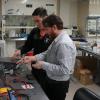 Researchers in the Multifunctional Materials Interdisciplinary Research Theme are trying to create the internet of living things.
Researchers in the Multifunctional Materials Interdisciplinary Research Theme are trying to create the internet of living things.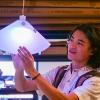 Research and creative work exposition, laboratory and studio tours, demos, poster presentations, and discussion with faculty members and graduate students.
Research and creative work exposition, laboratory and studio tours, demos, poster presentations, and discussion with faculty members and graduate students. An open discussion in the new Aerospace Building with research leaders from across the university about the modern tools that are helping us understand and combat climate change. Panelists will discuss their work in the field through real world applications of the current technology and consider how the students on campus today address this issue in the future.
An open discussion in the new Aerospace Building with research leaders from across the university about the modern tools that are helping us understand and combat climate change. Panelists will discuss their work in the field through real world applications of the current technology and consider how the students on campus today address this issue in the future.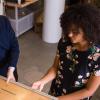 The University of Colorado Boulder is one of 24 institutions to receive Google’s exploreCSR grant, which supports universities that are trying to get more women involved in computing research careers by running research-focused workshops.
The University of Colorado Boulder is one of 24 institutions to receive Google’s exploreCSR grant, which supports universities that are trying to get more women involved in computing research careers by running research-focused workshops. A top-level National Science Foundation administrator will speak about the past and future of Engineering Research Centers and offer a technical presentation at CU Boulder in mid-October.
A top-level National Science Foundation administrator will speak about the past and future of Engineering Research Centers and offer a technical presentation at CU Boulder in mid-October.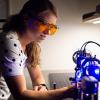 CU Engineering had another record-breaking year for research funding in the college with $108 million in fiscal year 2019. This is the highest total ever for the college and the second year in a row when awards were above $100M.
CU Engineering had another record-breaking year for research funding in the college with $108 million in fiscal year 2019. This is the highest total ever for the college and the second year in a row when awards were above $100M. Tours of engineering’s out-of-this-world facilities. In-depth panel discussions with leaders from across campus. Hands-on exploration of student-led research. Online giveaways for undergrads. These are just a few of the ways CU Engineering is leading Research and Innovation Week on campus this year.
Tours of engineering’s out-of-this-world facilities. In-depth panel discussions with leaders from across campus. Hands-on exploration of student-led research. Online giveaways for undergrads. These are just a few of the ways CU Engineering is leading Research and Innovation Week on campus this year.
Research and Innovation Week 2019 will be held Oct. 14-18 and is hosted by the Research and Innovation Office. The goal is to showcase and demonstrate the broad impact of CU Boulder research, scholarship and creative works. This is the second year of the program and should be bigger and better than the last.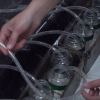 The costs of wildfires extend far beyond the burn zone. Wildfires can heat soil to temperatures up to 1,000º F (550º C), releasing higher concentrations of carbon, nitrogen and other organic materials from the soil. When rain falls, those contaminants can be carried into nearby watersheds, increasing concentrations by up to 700%.
The costs of wildfires extend far beyond the burn zone. Wildfires can heat soil to temperatures up to 1,000º F (550º C), releasing higher concentrations of carbon, nitrogen and other organic materials from the soil. When rain falls, those contaminants can be carried into nearby watersheds, increasing concentrations by up to 700%. CU Boulder is part of a new, $100 million interdisciplinary partnership to address critical water security issues in the United States over the next five years.
CU Boulder is part of a new, $100 million interdisciplinary partnership to address critical water security issues in the United States over the next five years.
 The College of Engineering and Applied Science is establishing new research collaborations and launching an international engineering course in Ecuador, continuing the college’s efforts to expand its global reach and impact.
The College of Engineering and Applied Science is establishing new research collaborations and launching an international engineering course in Ecuador, continuing the college’s efforts to expand its global reach and impact.

